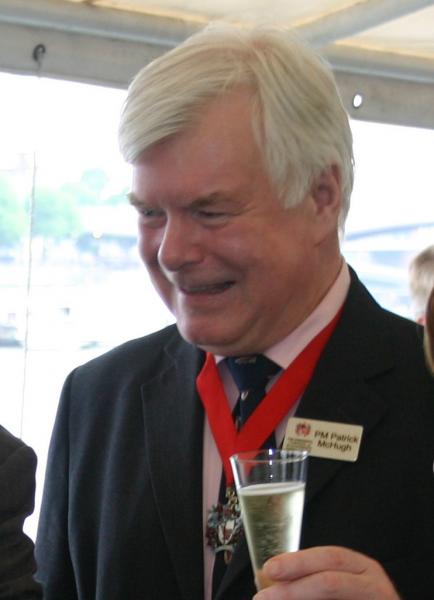Core to management consulting and building business success is maintaining a sceptical approach....
This theme might seem unusual for a management consultant concerned with the way business can lead to the advancement of society. It might be imagined that management consultants should be arguing to reduce doubt rather than to defend it. My intent though is to argue that doubt should be encouraged. It is a critical step in the progress of gaining knowledge, particularly business knowledge. A recognition of the significance of doubt is

"By doubting we come to inquiry, and through
inquiry we perceive truth".
Peter Abelard
important for the pursuit of successful business, for interactions between business and society, and for that matter for society as a whole.
I gained my idea for this article from Sir Paul Nurse FRS FMedSci a geneticist and cell biologist who has worked on how cell reproduction is controlled. He is Director of the Francis Crick Institute in London, and has served as President of the Royal Society, Chief Executive of Cancer Research UK and President of Rockefeller University. He shared the 2001 Nobel Prize in Physiology or Medicine. Sir Paul of course spoke about scientists needing to be doubters but I felt strongly that the same arguments applied to businessmen and society.
My starting point is the 11th century French monastic scholar Peter Abelard, who identified doubt as a crucial step in the pursuit of truth when he stated that: “By doubting we come to inquiry, and through inquiry we perceive truth.” What Abelard meant was the need to recognise that all is not known with certainty about the world.
Abelard, originally called "Pierre le Pallet", was born c. 1079 in Le Pallet, about 10 miles (16 km) east of Nantes, in Brittany, the eldest son of a minor noble Breton family. As a boy, he learned quickly. His father, a knight called Berengar, encouraged Pierre to study the liberal arts, wherein he excelled at the art of dialectic (a branch of philosophy), which, at that time, consisted chiefly of the logic of Aristotle transmitted through Latin channels. Instead of entering a military career, as his father had done, Abelard became an academic. During his early academic pursuits, Abelard wandered throughout France, debating and learning, so as (in his own words) "he became such a one as the Peripatetics." He studied in the Loire area, where the nominalist Roscellinus of Compiègne, who had been accused of heresy by Anselm, was his teacher. He died in 1142 and his ideas would have been well known to the young Eleanor of Acquitaine.
Doubting embraces a sceptical approach, challenging the views of established opinions and authorities about knowledge and understanding. We should all become a Doubting Thomas. A Doubting Thomas being a skeptic who refuses to believe without direct personal experience—a reference to the Apostle Thomas, who refused to believe that the resurrected Jesus had appeared to the ten other apostles, until he could see and feel the wounds received by Jesus on the cross. Indeed, doubt together with curiosity form the mainsprings of the pursuit of knowledge. Maintaining a sceptical approach during inquiry also leads to an absolute respect for observation, experiment and consistency in results. It underpins the need to develop ideas that can be tested and which are therefore capable of

The Incredulity of Saint Thomas by Caravaggio
refutation.
All of these are core attributes of management consulting and building business success. Such a focus on doubt and scepticism contrasts with views of the world which emphasise ideologies, faith and beliefs, since these do not depend on empirical support derived from direct evidence or proof, but rather depend on testimony or authority, and so some consider doubt of little value or even as a weakness. An obvious example, less of an issue in the UK but important in the USA and Muslim countries, is the promotion of creationism as an explanation for the diversity of life. Creationism essentially depends upon received authority for its support and therefore is not subject to doubt or refutation, both of which are central to proper enquiry.
Doubts can also become marginalised when grand ideologies are too zealously embraced, becoming excessively self-referential and incapable of refutation. Two examples of ideologies which many have argued suffer these problems are Marxism and Freudianism. Ideologies such as these, as well as other more faith-based thinking, have and will continue to provide important insights, but when they are used as the only prism through which the world should be observed and understood, then intellectual impoverishment is generally the outcome.
Doubt also encourages both a diversity of ideas and a healthy sceptical approach, which helps test the validity of those ideas – a surer way to arrive at reliable knowledge.
Doubt and scepticism are crucial for proper enquiry, but that is not how society always views management consulting and business. The great ideas of business have usually been subject to prolonged investigation and market testing and, having survived such intense interrogation, they become accepted as highly reliable explanations for how the world works. This is how we teach business management at school and how we management consultants often portray ourselves in the media, encouraging society to view businesses as always dealing in certain knowledge.
Long-standing and well-tested ideas of managing business should have a high status for reliability, but this does not always apply to many of the problems of business under current investigation, problems in which society often has great interest.
Good examples are biomedical problems, such as the causes, treatment and prevention of disease, the genetic basis of behaviour, and the influence of diet and pollution on health. Frequently knowledge in these areas falls into the category of tentative knowledge, but such hesitant understanding is thought to be unsatisfactory when society and its leaders are seeking, quite understandably, greater certainty.
A frequently occurring example is whether a newly-discovered technology – an application, a computer virus or a security system – will cause a major computer crash, a question which most businesses working in this area often find very difficult to answer in the early stages of development. Yet clear advice about whether this is likely or not is of great importance to governments and the public, who are wrestling with how to manage a potential major threat to society.
This disconnection between the need and desire for sure knowledge on the one hand, and uncertain understanding on the other, is a major cause of problems in interactions between business and society. Society looks for certainties and believes business can usually provide them, while businesses can be in a state of tentative knowledge which cannot always provide the certainties required in the timeframe within which they are needed. The problem is exacerbated when less-scrupulous political leaders or ideologists shelter behind poorly supported views or criticise high quality research when trying to bolster a particular political or ideological opinion, or when attempting to support specific commercial activities.
As an example of the latter, take those who deny the evidence of climate change by arguing that the majority of climate scientists should be ignored, when the real motives of such denialists are perhaps more to do with promoting libertarian ideology or with protecting specific commercial interests.
I believe that the future will judge this debate in much the same way as we now view the tobacco industry’s denial that smoking causes cancer. How can this mismatch between what society expects and what business can deliver be dealt with? I would argue that the way forward is to encourage effective public dialogue, openness, and honesty. This requires: a willingness of engaged businesses to talk with, and listen to, the public about the issues; an openness to explain the true nature of business and the benefits it produces (which can range from financial support for governments to technologies which can feed and house billions of people); and an honesty to admit when we are in doubt and cannot provide the clarity required.
This last point can be a real issue with the coverage of business in the media, where the wish to provide differing views and perhaps, less laudably, the entertainment of promoting a confrontation between individuals at polar opposites, can lead to the excessive exposure of fallacious ideas, held and presented by zealous individuals who lack both doubt and also any significant logical support for their positions.
I want to take my defence of doubt one step further, to the healthy functioning of society on a more global scale. Real dangers threaten the world when those with intolerant fundamentalist religious or ideological beliefs come to political power or have too much influence on those in political power. Their lack of doubt leads them to believe that they are always in the right, producing groups, governments and regimes which do not listen to the opinions of others, which are not interested in dialogue, and which turn all too readily to violent interventions to impose their orthodoxies on others.
We are in real need of greater doubt in today’s world, not only for the advancement of knowledge and its effective use for the benefit of humanity, but also to make the world a safer place. Francis Bacon, the seventeenth century English architect of the scientific revolution, eloquently summed up this argument when he wrote in The Advancement of Learning: “If a man will begin with certainties, he shall end in doubts; but if he will be content to begin with doubts, he shall end in certainties.”

Past Master Patrick McHugh